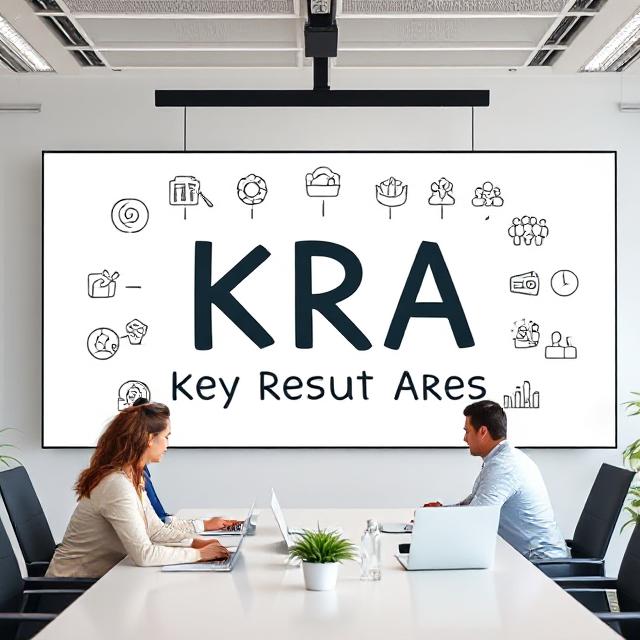



While considering performance management systems and how they align with organizational objectives and goals, the abbreviation KRA pops up quite frequently. But what does it entail, and what is its relevance for employees and the organization alike? Let us consider KRA's relevance in more detail.
What is KRA?
An employee's KRA is an integral part of the overall performance management system, and it refers to Key Result Areas. Each employee is given a specific area that they are accountable for, ex, in their given role in the organization. Simply put, the KRAs outline the work and core responsibilities an employee is required to perform. KRA's scope enables employees to grasp what is expected of them and to align they’re efforts with the goals of the organization.
KRA Examples
Sales Executive:
- Attain monthly sales goals of ₹10,00,000.
- Create 50 new client leads every month.
- Achieve 90% client retention.
HR Recruiter:
- Close 15 open positions each quarter.
- Decrease average hiring time to 30 days.
- Maintain 95% offer-to-join ratio.
Digital Marketing Executive:
- Boost website traffic by 40% within 6 months.
- Deliver 200 qualified leads each quarter.
- Reach 5% social media engagement.
KRA vs. KPI
People often confuse KRA (Key Result Areas) with KPI (Key Performance Indicators). Here’s the difference:
KRA sets general areas of responsibility.
KPI sets the specific measurable values that track success within those areas.
Example:
KRA: Improve customer satisfaction.
KPI: Attain a Customer Satisfaction Score (CSAT) of 90%.
Tips for Effective Definition of KRAs
Understand the Role- Deconstruct the job responsibilities.
Identify Key Results- Identify the position and the most important key results that are expected of the job holder.
Make Them SMART- Create KRAs that are Specific, Measurable, Achievable, Relevant, and Time-bound.
Integrate with Organizational Goals- Confirm that the employee KRAs are geared towards the success of the employee and the organization.
Regularly review- Adapt staff KRAs in line with changing business needs.
Benefits of KRAs for Organizations
Effective and measurable performance tracking.
Easier performance appraisal.
Streamlined communication of expectations.
Increased productivity and efficiency of work.
Better coordination between staff and the organization as a whole.
Conclusion
In performance management, KRAs are central, and they define the scope of work. They also show the employee the accountability and decision scope that the organization has given them. For the employee, KRAs show them the exact steps they need to take to succeed in the role; for the organization, KRAs are a streamlined way to show productivity and growth.
Braintech Education and Placement Services records business growth for both the business and employees. By defining KRAs, we help professionals understand their skills and help organizations identify the right employees.
Frequently Asked Questions (FAQs) About KRA
Q1: What does KRA stand for?
A: KRA stands for Key Result Areas.
Q2: How is KRA different from KPI?
A: KRA outlines the big picture responsibilities, while KPI (Key Performance Indicator) focuses on assessing specific outcomes within those responsibilities.
Q3: Why are KRAs important for employees?
A: KRAs reduce ambiguity and provide accountability, and measurable objectives that assist employees in focus and enhance performance.
Q4: How are KRAs used in performance appraisals?
A: KRAs serve as objective criteria that determine if the outcomes are achieved by an employee, and this makes the appraisals fair and transparent.
Q5: Can KRAs change over time?
A: KRAs are responsive to the changes in the business and role, and as such should be evaluated and revised persistently.
Q6: Who defines KRAs in an organization?
A: Typically, KRAs are defined by the managers or the HR, in consultation with the employees.
Q7: Can placement services help in defining KRAs?
A: Yes, placement consultancies like Braintech Education and Placement Services assist not only in recruitment but also in defining KRAs to organizations to aid role clarity and enhance performance management.